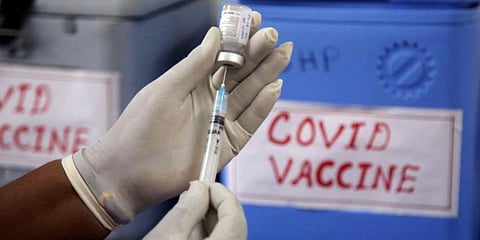

HYDERABAD: The announcement of the rollout of the much-anticipated vaccine for Covid-19 was welcomed with mixed feelings by the global community. In India, we presently have two vaccines – COVAXIN and COVISHIELD. The development of the vaccine in less than a year into the pandemic is no mean feat, however, the ambiguity around the safety and effectiveness of the vaccine in such a short time has created various misgivings about the same.
As reported in The New Indian Express last Saturday, February 13, at least 556 healthcare workers in Telangana refrained from getting the second dose of the Covid-19 vaccine, and the same trend continued on Monday. Fear of adverse reactions such as fever and body pains and news of people with comorbidities dying after taking the vaccine is touted as reasons that are making health workers reconsider the second dose.
This disease is relatively new and there is fear about the effect of the vaccine on people.
“The vaccine can be safely given to all, including those patients with past history of Covid-19,” says Dr Ratnamani, head and senior consultant microbiologist, Apollo Hospitals, Jubilee hills. “People get worried about the composition of vaccines. Every single vaccine goes through safety evaluation to make sure that it is safe before it is used. There has been very clear information provided by vaccine manufacturers about the safety of the vaccine, its contraindications, and its side effects,” Dr Ratnamani adds.
Side effects
“The common side effects of Covid-19 vaccine are pain and swelling at the injection site, fever, chills, tiredness, headache, nausea or vomiting and swollen lymph nodes for a day or two,” commented Dr Riyaz Khan, CEO, Continental Hospitals. At least 800 frontline staff at his hospital have taken the vaccine and none have suffered any major side effects, he informed.
“The minor side effects can be managed by taking paracetamol or a mild pain killer, drinking plenty of fluids, and applying a clean and wet cloth over the area,” added he. Dr Riyaz admitted that serious allergic reactions to Covid-19 vaccine could occur, but they are rare. “That is why you will be asked to rest for observation for 30 minutes after vaccination,” he shared. Saying that people with a history of severe allergic reactions should mention so at the time of vaccination, he advised not to get the second shot if there was a serious reaction to the first one.
Myths and facts
With unsolicited opinions and news about the vaccine pouring in from all corners, it is critical to debunk the misinformation around it, says Dr L Sanjay, Internal Medicine Department, Apollo Spectra Hospital, Kondapur. He debunks some common myths regarding the vaccine hesitancy.
Myth: You don’t need to wear a mask if you are vaccinated
Fact: According to experts at National Institutes of Health (NIH), the immunity against Covid-19 could be similar to that developed during measles, if you get measles once, you are immune for life. But with Covid-19, this is still a presumption because the longevity of the immunity from the vaccine is yet to be ascertained.
Myth: Natural immune system is better than vaccine immunity
Fact: The World Health Organization (WHO) advises that intentionally exposing oneself to the virus can lead to more infections. The medical fraternity has raised concern in this regard as the antibody level in a body against the virus varies from person to person.
Myth: If you already had Covid-19, you don’t need the vaccine
Fact: While it’s true that being infected gives the body certain immunity against virus but there is also evidence that this type of immunity is not long lasting and the chances of catching the infection again is high.
Myth 4: The mRNA vaccine will alter your DNA
Fact: The mRNA vaccination is a method of eliciting a response from one’s immune system by introducing inactivated germs into immune systems, which prompts the body to build a specific kind of protein called spike protein, the crucial piece that combats the coronavirus. The protein does not enter the nucleus of the cell and thus cannot affect the DNA.
Myth 5: Herd immunity
Fact: Herd immunity is when the majority of people are immune to a disease, consequently making the spread unlikely. Herd immunity can be achieved only when the population is immune either through vaccination or immunity developed from previous infection.
At least 800 frontline staff at Continental Hospitals have taken the vaccine and none have suffered any major side effects
— Tamanna S Mehdi tamanna@newindianexpress.com @tamannamehdi